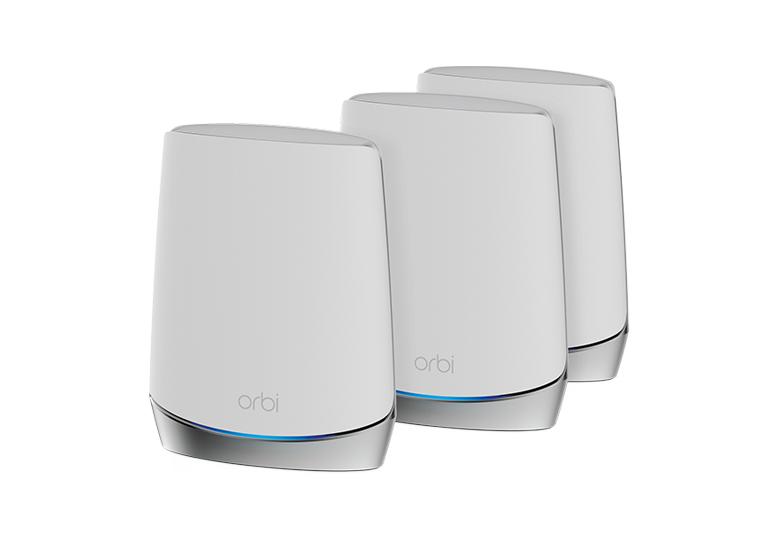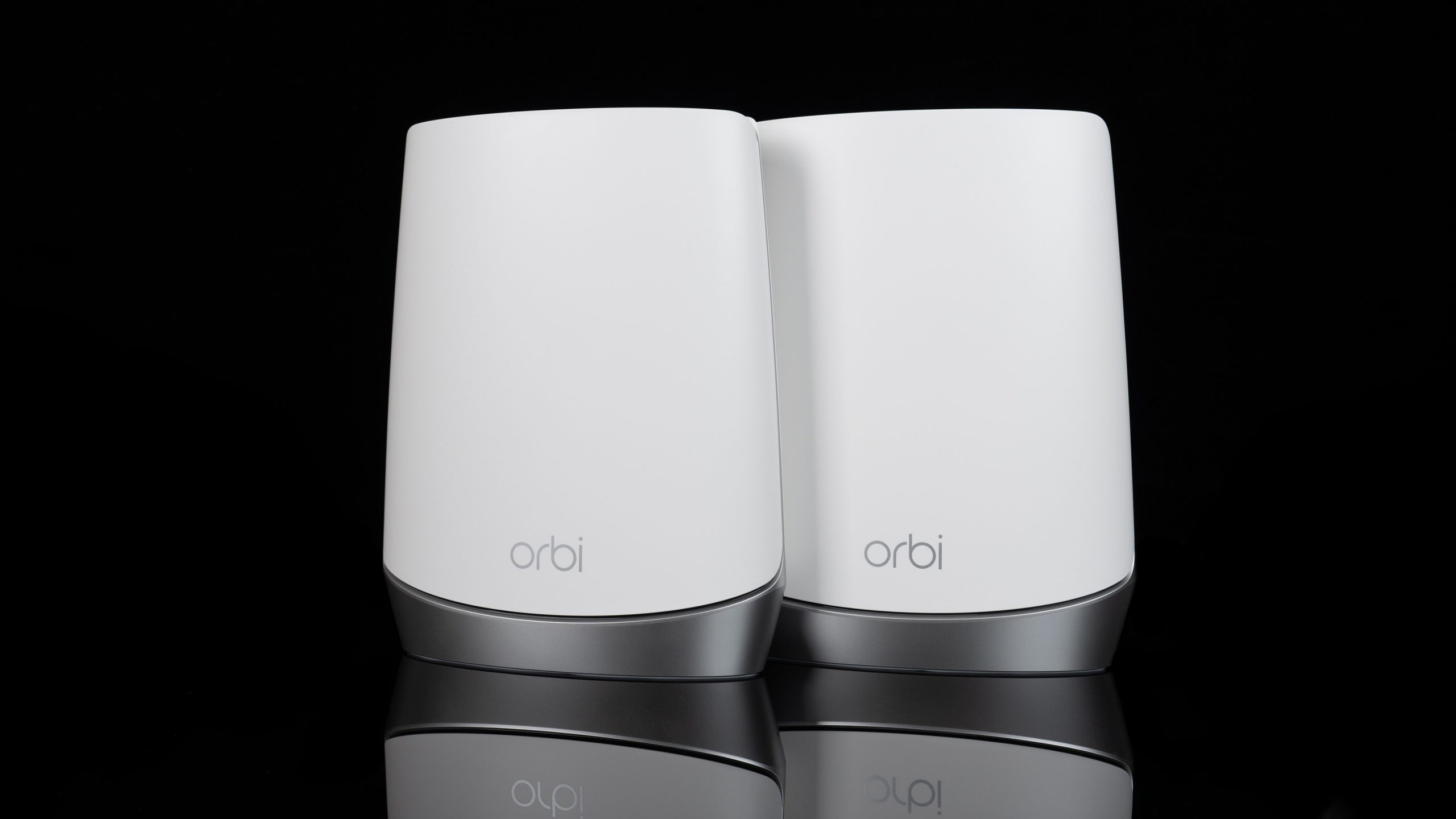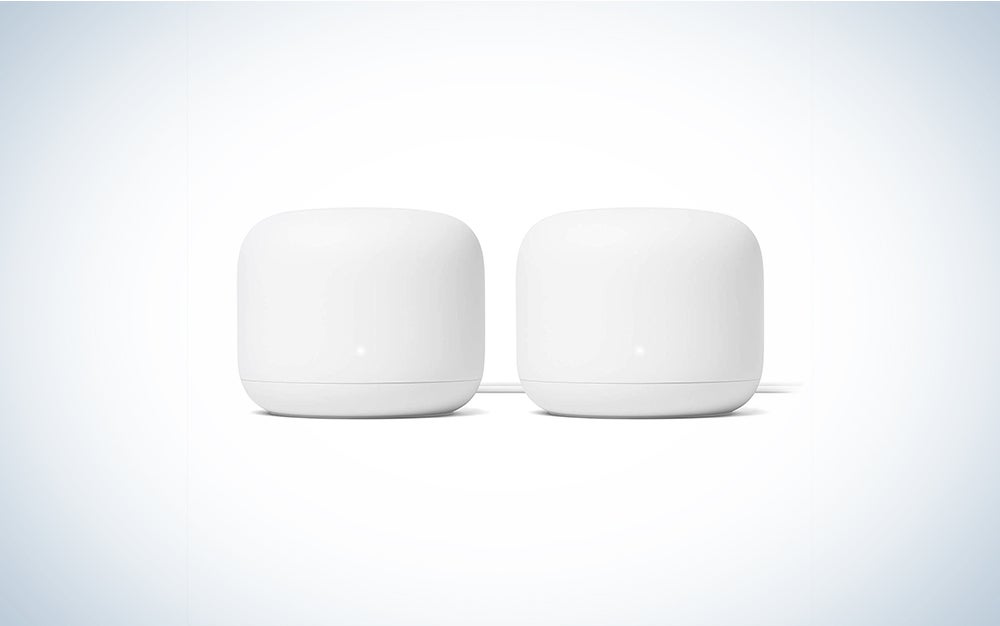Orbi Ax4200 Review

Quick And Easy Mesh Installation For Non-Experts Using The Orbi App
The NETGEAR Orbi was delivered in a nicely-packaged package. The box contained a simple ‘Let’s Get Started’ instructions card. It was obvious that NETGEAR has made it as easy as possible to set up its Orbi systems. Our box contained three devices – one labelled ‘Router’ (with pre-set wireless settings attached to it) and two labelled ‘Satellite’. All units looked and felt well-built, substantial and aesthetically pleasing.
The box also contained a single Ethernet cable (used to connect the Orbi router to a modem) and three power supplies. The lack of additional Ethernet cables indicated that NETGEAR assumed that satellites will be installed in wireless mesh mode. This means that they would use a wireless backhaul connection to connect the router to satellites. The satellites have Ethernet connectivity, which allows for a cable connection.
The set up was easy and the instructions were clear. Registering the product online was easy. Then, you could download the NETGEAR Orbi app and scan the QR code at the bottom of your Orbi unit. Easy installation is possible with the NETGEAR Orb App, available for mobile or tablet devices.
The Orbi app provides step-by-step instructions throughout set-up. This is a key feature of the Orbi platform. The app showed how to position satellites. It said, for example: “Place satellites at table level, far away from metal shelves and fish tanks.”
The app is checked to ensure it has the latest firmware during the installation.
The app was then confirmed
If you were a fan of this, you might also be into
Tp Link Deco Ac1200 Review
Successful update. Your Orbi’s firmware was successful updated.
At the completion of the set-up process, we received the following confirmation:
The Wi-Fi 6 mesh network was fully functional and we didn’t have to worry about any technical aspects. This is a huge advantage for users of broadband who want an easy upgrade.
We were able to better understand the system that had been automatically configured using the software WiFi Explorer, and the screenshot from this is shown below:
If you were a fan of this, you might also appreciate
Ubiquiti Amplifi Review
The Netgear Orbi automated set-up set resulted in identical channels being used by the router and all satellites in both the 2.4 GHz and 5 GHz bands. All devices used the same 80 MHz channel at 5 GHz (channels 36-48). In addition, all devices used the same 80 MHz channel at 5 GHz (channels 100-112) for the backhaul connection (described in the next section). To avoid interfering, we would like to adjust the radio channel allocations. For the optimum way to set up Wi-Fi, visit our Wi-Fi Set Up Guide.
To test the Orbi system, we placed a satellite in an upstairs room at the other side of the building to the room containing the Orbi router. We ran a speed test on our iPhone 12 Pro Max mobile phone. Our speed tests in the same room as the router gave an average download speed of about 720 Mbps (for our Gigabit broadband connection) with a latency (ping) of 7 ms, which is a very good result. We then connected the phone to the satellite point and reran the speed test. The average speed was 500Mbps, with a 10 ms ping. However there were more variations in the speed. With the Orbi satellite switched off (so the mobile phone operated to the more distant Orbi router), the speed test experienced rapid speed fluctuations, with an average download speed of 80 Mbps and a ping of 7 ms. These measurements demonstrate the value of a mesh wireless system. The satellite clearly improves speeds substantially compared with a single Wi-Fi router solution. However, there is a performance penalty using the Orbi in terms of speed and latency when using wireless backhaul, which can be eliminated by connecting Orbi satellites with Ethernet cables (as described in the next section).

Netgear Orbi Rbk752 Review: Performance
As was the case with the RBK852, the RBK752 kit started out strong and its performance fell off quickly with distance. Using Ixia’s IxChariot networking benchmark software we created a busy network with 10 simulated users in my 100-year-old, 3,500-square-foot house. Overall, it did well, but couldn’t fill my home with Wi-Fi, although a third device would likely have done the trick.
The RBR750 router alone was capable of delivering 506.7Mbps at 15 feet to the Dell XPS 15 testing system. This roughly tied the Linksys Velop AX4200 (507.7Mbps) and ahead of the Eero Pro 6 (436.1Mbps). However, none of these speeds could match the Netgear Orbi WLAN 6 RBK852 router which reached 833.6Mbps.
With 50-feet separating the test machine from the router, the RBR750’s bandwidth dropped to 100.3Mbps. Although this is sufficient for most purposes, it was still not enough to match the Eero Pro 6 (239.9Mbps), Linksys Velop AX4200 (21.3Mbps), and Netgear Orbi RBK852 (124.4Mbps).
The RBK752 was able to move only 82.5Mbps at 75 feet, which is less than the Netgear Orbi RBR852 (88.5Mbps) and a lot slower than the Eero Pro 6 (208.9Mbps). By contrast, the Linksys Velop AX4200 moved 139.6Mbps. At 85 feet, the RBR752 lost contact with the Netgear RBR852 but was well ahead of the Eero Pro 6 at 105 feet.
If you found this entertaining, you might enjoy
Orbi Wifi 6 Review
When it was trying to send a signal over 25 feet, the Netgear Orbi RBR852 struggled with Wi-Fi 6 mesh routers. On the other hand, there were 326.6Mbps of available bandwidth on both sides. Under the same conditions, the Netgear Orbi RBR852 moved 782.9Mbps, while the Linksys Velop AX4200 was able to deliver 525.7Mbp and the Eero Pro 6 coming in at 375.6Mbps.
The Orbi RBR752 (281Mbps) came in second to the RBR852 (670Mbps) when it was trying to send a signal from a bedroom to the floor. The Linksys Velop AX4200 and Eero Pro 6 were in a virtual tie at 437.5Mbps and 430.9Mbps of throughput.
With a satellite connected 50-feet from the router on the same floor and the test system another 40-feet away, the RBK752 mesh network came up short with 87.7Mbps of data delivered to the test system. That’s roughly half the Linksys Velop AX4200 (161.1Mbps), although it’s a lot better than the Netgear Orbi RBK852 (39.1Mbps). Eero Pro 6 was somewhere in the middle with 142.3Mbps bandwidth.
The throughput of the satellite, which was 50 feet above the router, was 209.5Mbps. This is about half the speed that the Orbi RBK852 could handle. That said, the Linksys Velop AX4200 (329.2Mbps) was impressive, nonetheless.
After using the RBK752 for emails, downloads, music, video and gaming, it did well in my old house, but left a few dead zones. A third unit — like that which comes with the Orbi RBK753 three-pack — would likely have made for a whole-house network. Still, the RBK752 passed our saturation test by streaming high-quality video on my Macbook air while I had Spotify playing music on an Apple iPad Pro tablet and a Lenovo ThinkPad T470 was playing an Internet radio station. All this was going on while an HP Dragonfly Elite notebook moved data onto and off of a network-attached RAID storage system. There were no drop-outs, artifacts or glitches with the audio or video streams.
The router as well as the satellite required 8.6 watts to operate. The network should be left running 24/7 and cost approximately $9.80 per unit. This assumes that the equipment is on all the time. You also pay 13 cents for every kilowatt-hour of electricity. This is $5 more than the RBK852 at $24.40 per year, and $15 less than operating the Arris SURFboardMax two-piece kit.

Features Of Netgear Orbi Ax4200 (Rbk752) Mesh

Netgear Orbi App & Orbi Setup
Download the Orbi App for Apple or Android. Then find your device in the app. Inside the app, you will see connected devices, check your Internet speed, and set parental controls. It is possible to change the password and network name of your WiFi account. You don’t need a smartphone Visit orbilogin.com to access the router settings. When you log in, the initial password will be required. By default it is “admin”. When you first attempt to login, ask for a username. Make sure it is secure and take a note of it. This username and password are for the router and satellite settings login. This is not the same as your WiFi name and password. This information is on the router label and can be changed if you wish once you log in to the mesh system settings.
Also in the Orbi AX4200 mesh router series is the CBR750. The CBR750 is equipped with a built in DOCSIS 3.1 cable modem, which supports multiple gigabit cable internet service. The CBR750 is compatible with Comcast XFINITY, Cox, Sparklight, Spectrum, and more. Learn more about the NETGEAR Orbi CBR750. The modem/router combo also comes in a package deal under NETGEAR # CBK752. The package deal includes one Orbi satellite extensioner and a cable modem. Cable modem/routers typically cost $399.99. Amazon often has a sale for the modem/router that comes with one extender, which costs around $599.99.

